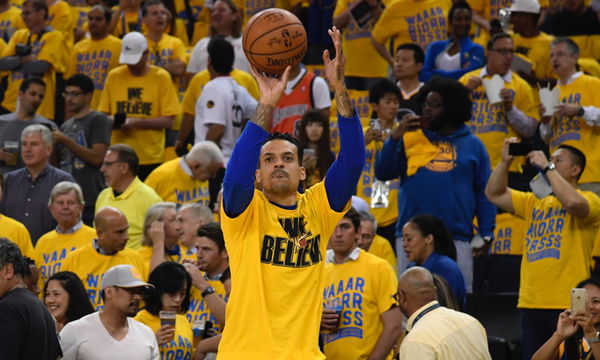
Imago
Nov 27, 2017; Oakland, CA, USA; Former Golden State Warriors player Matt Barnes smiles before receiving his championship ring before the game against the Sacramento Kings at Oracle Arena.

Imago
Nov 27, 2017; Oakland, CA, USA; Former Golden State Warriors player Matt Barnes smiles before receiving his championship ring before the game against the Sacramento Kings at Oracle Arena.
From the hardwood to the microphone, Matt Barnes proved that life after the NBA can be just as intense and successful. Imagine a player who brought grit and intensity to every game—whether he was suiting up for the Clippers, Kings, Knicks, or Suns. Yep, none other than Barnes. After making millions of dollars from 14 seasons in the NBA, he hung up his jersey in 2017 with a well-deserved championship ring from his final stint with the Golden State Warriors. But Barnes didn’t just fade into retirement.
Watch What’s Trending Now!
In fact, his influence may have even grown, spilling over to fans who wouldn’t recognize an NBA roster but know him from his time with Basketball Wives star Gloria Govan. And for those who thought Barnes might slow down after basketball? Not a chance. His next chapter saw him joining the sports media world with major networks like ESPN. But Barnes had a bigger vision—one where he could keep it real without the typical media restrictions. So let’s find out how much he made through this diverse career path of his and how exactly he did it.
ADVERTISEMENT
Matt Barnes’ Net Worth and his earnings from the league
Matt Barnes’ net worth sits at an impressive $13 million, a number earned through grit, hustle, and adaptability during his 14-season NBA career. While Barnes may not be among the stars like LeBron or Curry, his $35 million career earnings tell the story of a player who consistently made an impact.
Throughout his NBA career, Barnes played for a variety of teams, earning salaries that steadily increased as he became an established presence in the league. For example, during the 2017-2018 season with the Sacramento Kings, Barnes earned his highest salary of $6,400,625, as per HoopsHype.
Top Stories
Kyrie Irving Breaks Silence After Injury Return Update Emerges

Marina Mabrey Is Raising Eyebrows Again With Fiery Unrivaled Confrontation

Is Anthony Davis Playing Tonight? Mavericks vs Kings Latest Injury Report (Jan 6)

Unrivaled Commissioner Makes His Opinion on Paige Bueckers Very Clear

Napheesa Collier Gives WNBA Fans Good Reason To Be Excited About Delayed CBA Conversations


USA Today via Reuters
May 2, 2017; Oakland, CA, USA; Golden State Warriors forward Matt Barnes (22) shoots the basketball against the Utah Jazz before game one of the second round of the 2017 NBA Playoffs at Oracle Arena. Mandatory Credit: Kyle Terada-USA TODAY Sports
Other notable seasons include his 2015-2016 stint with the Memphis Grizzlies, where he earned $3,542,500, and his earlier years with the Los Angeles Clippers, where he made $3,396,250 in 2014-2015 and $3,250,000 in 2013-2014.
ADVERTISEMENT
Even during the seasons when his earnings were more modest, such as the $1,600,000 he earned with the Orlando Magic in 2009-2010 or the $1,765,000 with the Los Angeles Lakers in 2010-2011, Barnes maintained his reputation as a dependable and spirited player. However, his earnings did not stay limited just to the league.
ADVERTISEMENT
Matt Barnes’s income beyond the league
After becoming a frequent face on ESPN, Barnes built a solid reputation in the sports media world. But Barnes had bigger plans. He wanted to step away from the corporate suits and scripted conversations, aiming instead for a place where he could be himself and speak freely.
It all started in the most laid-back way possible—two ex-players, Barnes and Stephen Jackson, just hanging out, watching games, and talking sports the way they wanted to, with no filters. An idea pitched by Barnes for the podcast. As Jackson asked, “What’s a podcast?” Barnes didn’t have all the answers, but he had a vision. A space to drink, smoke, and keep it real in a way TV wouldn’t allow, as revealed by him on Shaq’s The Big Podcast.
ADVERTISEMENT

USA Today via Reuters
Oct 16, 2022; Las Vegas, Nevada, USA; NBA former player Matt Barnes attends the South Point 400 at Las Vegas Motor Speedway. Mandatory Credit: Gary A. Vasquez-USA TODAY Sports
And then came the big connection with Brian Dailey at Showtime Sports, and before they knew it, All The Smoke was born. The result? A hit podcast that took off like wildfire. In its very first season, All The Smoke even won Sports Podcast of the Year. By 2024, Barnes and Jackson managed nearly 2 million followers on YouTube and Instagram. And if you’re curious about the numbers, All The Smoke brings in an estimated $7.7K to $122.6K a year, according to Social Blade.
But that’s not the whole picture—think about the YouTube ad revenue and the big-name sponsors. And the fact that their success inspired other shows like Kevin Garnett’s KG Certified. So, when you hear that Barnes has built a net worth of $13 million, it makes sense.
ADVERTISEMENT
ADVERTISEMENT
ADVERTISEMENT
ADVERTISEMENT

